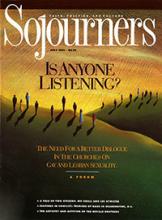This is an opportune moment to reflect on sports; in the spring and summer, they seem to envelope us. We're never without the American version of ancient Rome's "bread and circuses" for the masses. Besides the professional teams and the near-professional collegiate sports programs, we have golf, tennis, and that mayhem we call boxing to fill our TV screens. With our endless rounds of playoffs, championships, tournaments, final games, matches, and bouts of the year, the decade, the century, we find ourselves awash in games, games, games.
Despite aberrations such as this year's Super Bowl (played during the Persian Gulf conflict and laden with war language) and sports overkill in general, there remain obvious positive sides to athleticism. We marvel at Michael Jordan flying effortlessly toward the basket, ensuring a powerful slam dunk; 44-year-old Nolan Ryan pitching yet another no-hitter; hockey's Mario Lemieux splitting the defense and scoring an unassisted goal in the Stanley Cup playoffs; Chris Evert exuding unforgettable grace and dignity during her long reign as tennis' favorite daughter -- each of these stars evokes such pleasant images. And it's a wonderful sight to have Ken Griffey, father and son, playing side by side in the Seattle Mariners' outfield this year. When Griffey Junior makes one of his sparkling catches in centerfield the smile from Griffey Senior in left field simply dazzles.
These people and human stories, as much as final scores, are why we sports fans watch games. Anticipating them and actually seeing them gives us pleasure, brings back memories of other heroes and heroines, and renews an appreciation for well-trained women and men engaged in athletic events. The Olympic ideals of "faster, higher, stronger" thrill us fans when we see them achieved by talented sports figures.
Read the Full Article
